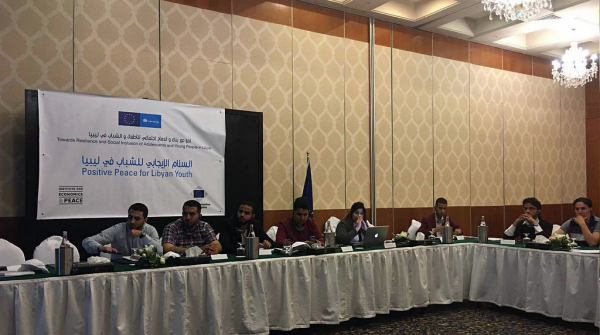Irish local government share best practices with Libyan counterparts

ECR Group Member Arnold Hatch (Alderman of Armagh City, Banbridge, Craigavon Borough Council) shared his experience of peace-building on the island of Ireland with 180 young leaders from across the lines of conflict in Libya, as part of an initiative to encourage younger Libyans to develop community-building projects in their home cities.
The four-day event, which was held in Tunis on 2-5 April, was one of three workshops on peace-building. They were the latest result of a two-year effort by the European Committee of the Regions (CoR) to establish cooperation between Libyan cities and European cities and regions, and to pool international expertise, experience and good will to help provide crucial public services in Libyan cities. The workshops reflect a broad collective effort: the CoR has driven the political and institutional collaboration, the content was developed by the Institute of Economics and Peace (IEP), the workshops were organised by UNICEF, and the funder was the Italian government.
"Hope – that is the principal message from the island of Ireland," said Arnold Hatch, who is also the President of Northern Ireland Local Government Association. "In our case, after decades of conflict, the removal of articles 2&3 of the Irish Constitution and some corruption in the form of smuggling, it has been possible to overcome issues by talking with all sides. It is hard work. But the hard work that brings peace is also work that makes our communities stronger and that makes life better for young people. Our communities are strong when civil society is strong, when there are sports clubs, youth clubs and cultural organisations that reach the young, when young people have an opportunity to learn, develop their skills, gain experience, and shape their world."
The 180 participants, who were aged 18-25, came from the Union of Libyan Youth, universities and civil-society networks and have been encouraged to think and develop ideas that could be applied in their communities. They came primarily from the eight cities with which the CoR has been working most closely under the "Nicosia Initiative" – Tripoli, Benghazi, Ghariyan, Tobruk, Sebha, Sirte, Zintan, and Zliten – but also from other populous areas, such as Misrata and Jufra.
The Nicosia Initiative is the CoR's capacity-building project aimed at strengthening Libyan local authorities. It matches the needs of Libyan municipalities with support available from European cities and regions. It aims to improve the living conditions of Libyan citizens, by strengthening public services and administrative capacity at the local level.

